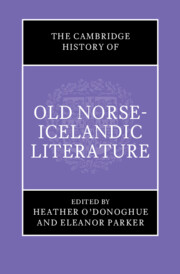Book contents
- The Cambridge History of Old Norse-Icelandic Literature
- The Cambridge History of Old Norse-Icelandic Literature
- Copyright page
- Contents
- Contributors
- Abbreviations
- Introduction
- Part I Contexts
- 1 History
- 2 Manuscripts and Textual Culture
- 3 Poetic Language, Form and Metre
- 4 Theoretical Approaches
- 5 Reception
- 6 Landscape and Material Culture
- Part II The Distant Past
- Part III The Saga Age
- Part IV The New Christian World
- PART V Beyond Iceland
- Part VI Compilations
- Glossary
- Bibliography
- Index
4 - Theoretical Approaches
from Part I - Contexts
Published online by Cambridge University Press: 08 February 2024
- The Cambridge History of Old Norse-Icelandic Literature
- The Cambridge History of Old Norse-Icelandic Literature
- Copyright page
- Contents
- Contributors
- Abbreviations
- Introduction
- Part I Contexts
- 1 History
- 2 Manuscripts and Textual Culture
- 3 Poetic Language, Form and Metre
- 4 Theoretical Approaches
- 5 Reception
- 6 Landscape and Material Culture
- Part II The Distant Past
- Part III The Saga Age
- Part IV The New Christian World
- PART V Beyond Iceland
- Part VI Compilations
- Glossary
- Bibliography
- Index
Summary
This chapter provides a chronological review of critical responses to Old Norse-Icelandic literature. The ‘book-prose vs free-prose’ debate is the starting-point for this overview, which then focuses on modern scholarship on sagas. The approach of the Icelandic school is discussed, followed by consideration of theoretical issues such as orality, structuralism, anthropological methods and the influence of non-Icelandic literary forms. Next come post-structuralism and narratology. The diversity of theoretical approaches which grew up towards the end of the twentieth century is documented, including post-colonialism and polysystem theory. Long-held generic distinctions are reviewed, and the development of gender studies with regard to Old Norse is described. Recent developments in the study of orality in prose and poetry are discussed, as are theoretical topics such as memory studies and the role of the paranormal. The chapter concludes with an account of the diversity of critical approaches to Old Norse-Icelandic literature and explains the need to employ integrated theories bringing in research from a number of disciplines, including archaeology, psychoanalysis and sociology.
Keywords
- Type
- Chapter
- Information
- The Cambridge History of Old Norse-Icelandic Literature , pp. 72 - 90Publisher: Cambridge University PressPrint publication year: 2024

